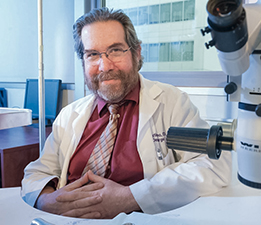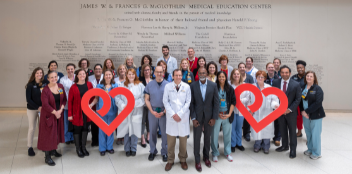Better than blood?
Promising crystalloid solution may improve survival time of patients
The new crystalloid IV solution developed by Martin Mangino, Ph.D., is getting national attention because it revolutionizes resuscitation for hemorrhage shock. The PEG-20k solution can save the lives of patients.
 Martin Mangino, Ph.D.
Martin Mangino, Ph.D.
Mangino, professor of surgery and associate chair for basic research in the Department of Surgery, and research director of the VCU Trauma Center started working on the project in 2010 when the military asked him to develop a new, low-volume crystalloid for use by the armed forces. “I put into practice what I learned in previous research to develop new solutions to preserve donor organs for transplantation,” he said.
Preclinical trials of the solution showed increases in survival even when compared to resuscitation with fresh whole blood. “It took the survival time from minutes to days,” Mangino said.
Take for example a soldier who is bleeding on a mountaintop in Afghanistan and needs immediate transport. The more stable that soldier is in the field, the better they will be in the hospital, Mangino said. “This new IV solution helps prolong a soldier’s stay in the field, which allows medics to take the time needed to transport the soldier to more definitive care at the forward field hospital.”
The research is funded by grants from the U.S. Department of Defense and the National Institutes of Health. The product is awaiting FDA approval for use in trauma patients with hemorrhagic shock and sepsis, and intensive care unit patients with critical illness. The solution can additionally be used in patients with sudden-death heart failure undergoing CPR.
Pre-clinical trials of the solution showed increases in survival even when compared to resuscitation with fresh whole blood.
This approach may improve patient survival, as well as normalize cardiac and brain functions after resuscitation from CPR. Currently only about 8% of patients survive out-of-hospital cardiac arrest and leave the hospital with normal brain function.
“We have a lot of applications we haven’t explored yet,” Mangino said. “We are going to put in the application with the FDA this year.”
First trials will be conducted in randomized testing at VCU when the solution receives an FDA exemption this year. Some patients will get PEG-20k, and some will receive the standard-of-care solution. “The military will probably get involved in trials, as well,” Mangino said.
Mangino is also studying applications of the IV solution in polytrauma, where someone suffers both a traumatic head or spinal cord injury and is losing large amounts of blood. “What this solution does is move water out of the cells and prevents swelling in the brain,” he explained. “It works by preventing cell swelling, which then opens capillaries and allows the body to exchange oxygen better.”
The trauma resuscitation fluid is “a game changer,” said Mangino, who is licensing the technology from VCU to his new company (Perfusion Medical LLC) to commercialize it. “It has such a dramatic effect when you compare it with the gold standard, whole blood. This is a big deal. We think we can save a lot of lives in the field and in the ICU. It’s a huge advancement.”
Back to Spring-2020

